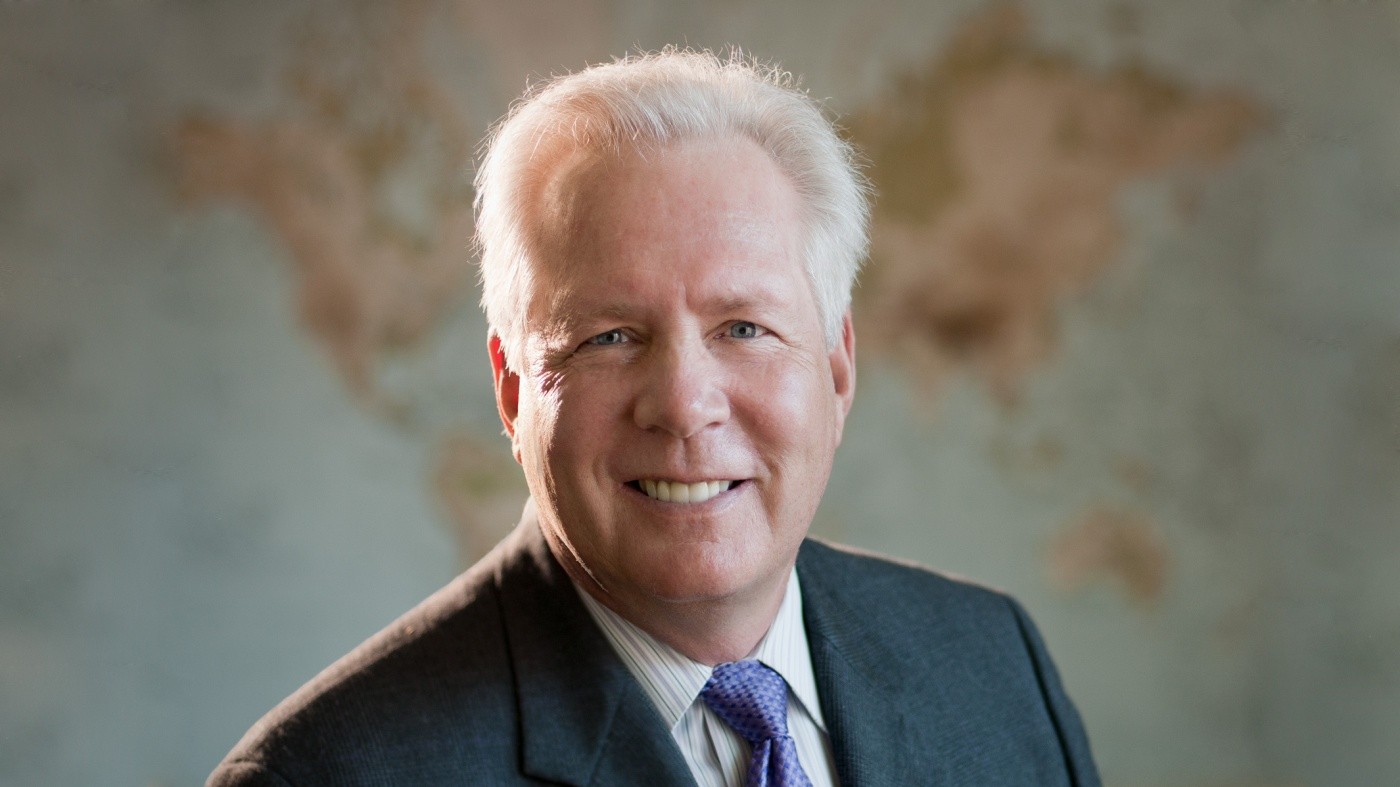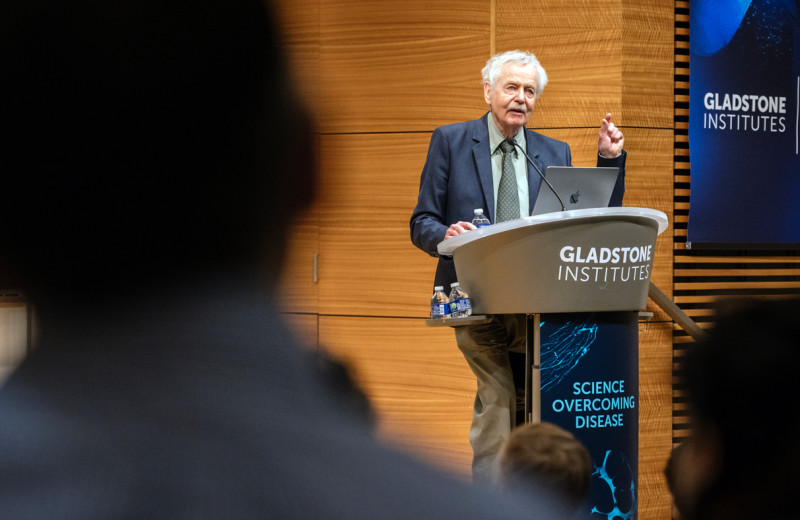Gladstone NOW: The Campaign Join Us on the Journey✕

Warner Greene, who has dedicated over 30 years of his career to understanding and treating HIV/AIDS, receives the 2019 Lifetime Achievement Award for Scientific Contributions from the Institute of Human Virology.
Warner Greene, MD, PhD, director of the Gladstone Center for HIV Cure Research, is receiving the 2019 Lifetime Achievement Award for Scientific Contributions from the University of Maryland School of Medicine’s Institute of Human Virology on Friday, October 4, 2019.
Greene performed pioneering studies of the two major human retroviruses, HTLV-1 and HIV. The award recognizes the many advances he has made in HIV/AIDS research, his impact on the Institute of Human Virology, and his international health efforts.
The award will be presented by Robert C. Gallo, MD, co-founder and director of the Institute for Human Virology, who discovered the first human retrovirus, HTLV-1, in 1980, and co-discovered HIV as the cause of AIDS in 1984.
“I’m honored to be recognized by the Institute of Human Virology with this lifetime achievement award,” said Greene, who directed the Gladstone Institute of Virology and Immunology from 1991 to 2018, and serves on the board of scientific advisors for the Institute of Human Virology.
Robert Mahley, MD, PhD, president emeritus of Gladstone Institutes, will introduce Greene at the award ceremony.
“I am immensely proud of what Warner has achieved and of the work he continues to do,” said Mahley, who recruited Greene to head the Gladstone Institute of Virology and Immunology in 1991, during the peak years of the AIDS epidemic.
The Lifetime Achievement Award also acknowledges Greene’s efforts during his time as president and executive chair of the Accordia Global Health Foundation from 2007 until it merged with Africare in 2016. Accordia focused on curbing the impact of infectious disease in Africa by building centers of excellence and strengthening medical institutions.
“Warner’s contributions to HIV/AIDS research and his dedication to the improvement of patients’ lives all over the world are truly inspiring,” said Gladstone President Deepak Srivastava. “We are delighted to see his life-long commitment to research and medicine so beautifully acknowledged.”
Greene has studied the mechanisms by which retroviruses multiply and interfere with their hosts extensively and from multiple angles during his career. His work on HIV began in the mid-1980s following the discovery of HIV-1.
He showed how HIV proteins thwart the antiviral action of host cell proteins, thus promoting the replication and propagation of the virus in its host. He also identified host proteins that help keep the HIV virus in a dormant state in a subset of infected cells. This subset is referred to as the latent reservoir, and constitutes the greatest barrier to HIV eradication and a cure for AIDS.
The latent HIV reservoir may spit out active virus at any time, and can rapidly restart a devastating infection in AIDS patients who interrupt antiretroviral therapy (ART). Therefore, HIV patients must remain on daily ART medication their entire lives.
Now, the focus of Greene’s Center for HIV Cure Research at Gladstone is to examine the molecular mechanisms that help form and regulate that latent reservoir. His team is seeking new ways to reduce and control the reservoir and free HIV patients from lifelong antiretroviral dependence.
Greene’s lab is also investigating how the human body’s immune system responds when under attack by HIV, and how the virus leads to extensive immune cell die-off. HIV grows inside immune cells, and progressive loss of immune cells in people with HIV leads to AIDS. But this loss does not reflect a direct action of the virus on immune cells, Greene’s team has found. Instead, partially infected immune cells trigger a strong immune response from healthy, non-infected immune cells. These healthy cells flood the infected area and die violently, spilling inflammatory signals out into the body. This chain of events links the progressive loss of immune cells and chronic inflammation that are characteristic of AIDS.
Greene will receive the Lifetime Achievement Award at this year’s Institute of Human Virology Meeting, titled “Progress in HIV/AIDS: Challenges in 2020,” on October 4, 2019, in Baltimore, MD, at a special awards dinner.
“This evening’s event is a highlight of the Institute of Human Virology’s Annual Meeting,” said Gallo. Greene will give the Institute of Human Virology Meeting’s Reinhard Kurth Lecture before the ceremony.
Every year, the Institute of Human Virology bestows the Lifetime Achievement Award for Scientific Contributions on a scientist whose work merits recognition and who has significantly impacted the Institute. Nominees are voted on by the Institute’s faculty.
The Institute also awards a Lifetime Achievement Award for Public Service, which this year will go to the Honorable Parris N. Glendening, former Governor of Maryland and president of Smart Growth America’s Leadership Institute and the Governor’s Institute on Community Design, and to the Honorable Kathleen Kennedy Townsend, director of retirement security at the Economic Policy Institute and former Lt. Governor of Maryland.
A Sculptor of Modern Regenerative Medicine
A Sculptor of Modern Regenerative Medicine
Among his myriad accomplishments, Rudolf Jaenisch—winner of the 2025 Ogawa-Yamanaka Stem Cell Prize—was the first to demonstrate the potential of induced pluripotent stem cells to treat disease.
Awards Ogawa Stem Cell Prize Profile Regenerative Medicine Stem Cells/iPSCsSix Gladstone Scientists Named Among World’s Most Highly Cited Researchers
Six Gladstone Scientists Named Among World’s Most Highly Cited Researchers
The featured scientists include global leaders in gene editing, data science, and immunology.
Awards News Release Corces Lab Doudna Lab Marson Lab Pollard Lab Ye LabBringing Modern Science to Vitamin Biology: Isha Jain Wins NIH Transformative Research Award
Bringing Modern Science to Vitamin Biology: Isha Jain Wins NIH Transformative Research Award
Leveraging modern scientific tools and techniques, Jain intends to transform our understanding of the critical roles that vitamins play in health and disease.
Awards News Release Cardiovascular Disease Jain Lab Metabolism



